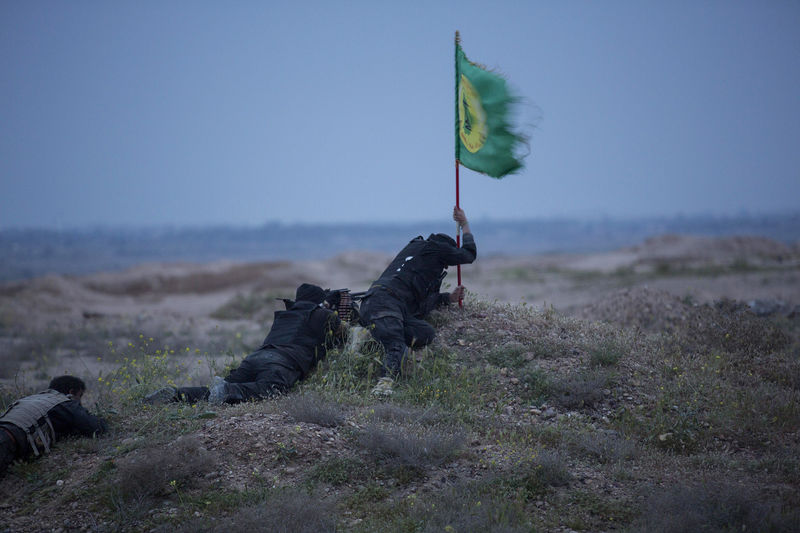By Saif Hameed
BAGHDAD (Reuters) - Frustrated by guerrilla tactics from Islamic State militants, Iraqi forces paused for reinforcements on Friday in a major offensive to take back the city of Tikrit.
The operation appeared to have stalled for the time being, two days after Iraqi security forces and their mainly Shi'ite militia allies pushed into Tikrit, the home city of executed ex-president Saddam Hussein.
A source in the military command said Iraqi forces would not move forward until reinforcements reached Tikrit, of which Islamic State still holds around half.
If government forces wrest full control, it will be the first time they have won back a city from Islamic State since it over-ran large areas of the country last year and declared an Islamic caliphate in territory it is holding in Iraq and Syria.
From there it has spread fear across the region by beheading Arab and Western hostages and killing or kidnapping members of religious minorities like Yazidis and Christians.
In Tikrit, the militants have deployed snipers and turned streets into a labyrinth of home-made bombs and booby-trapped buildings.
Forces loyal to powerful Shi'ite cleric Moqtada al-Sadr and known as the 'Peace Brigades' appeared to be positioning themselves to join the government offensive. Up to 1,500 fighters had reached the sacred Shi'ite city of Samarra, south of Tikrit, a source in Sadr's provincial office told Reuters.
The deployment came days after Sadr announced the "unfreezing" of his forces' participation in battles against the militants. He had suspended their actions after allegations of abuses committed by other Shi'ite militias during recent operations.
One official said he was told that the Peace Brigade fighters intend to push north toward Tikrit on Saturday.
Hadi al-Amiri, the head of the Shi'ite paramilitary Badr Organization and now one of the most powerful men in Iraq, said the outcome of the battle for Tikrit was in no doubt, but Iraqi forces needed time.
"We are not in a hurry, but we have a plan and we are following it," Amiri told state television from the frontline. "Even if the battle drags on for two, three or four days that is okay. We will celebrate the liberation of Tikrit from the enemy."
IRANIAN ROLE
A victory in Tikrit would give Iraqi forces momentum for the next stage of the campaign to retake Mosul, the largest city under control of Islamic State.
But the involvement of Iran, which backs some of the Shi'ite militia at the forefront of the campaign and is also playing a direct role, is a source of unease for some Sunnis in Iraq and across the wider region.
Iranian Revolutionary Guard Commander Qassem Soleimani has been spotted on the battlefield overseeing the Tikrit offensive. The foreign minister of Sunni Saudi Arabia, Saud al-Faisal, last week said the battle for Tikrit showed how Iran was "taking over" Iraq.
Islamic State fighters overran the city last June during a lightning offensive that was halted just outside Baghdad. They have since used the complex of palaces built in Tikrit under the late Saddam as their headquarters.
The insurgents were still in control of the presidential complex and at least three other districts in the center of Tikrit on Friday.
Iraqi special forces attacked a medical college in southern Tikrit at dawn, but the militants managed to fend them off, killing three soldiers, according to the military command source. A further six people were killed when a Humvee vehicle packed with explosives rammed into an outpost of the Iraqi forces to the west of the city.
More than 20,000 Iraqi troops and Shi'ite militias, supported by local Sunni tribes are taking part in the offensive, which began 11 days ago.
OFFENSIVE AROUND KIRKUK
Islamic State spokesman Abu Mohammad al-Adnani said in an audio-recording published on Thursday that its fighters remained "steadfast" and were growing in strength, dismissing its enemies claims of gains in Tikrit as "fake".
Adnani warned followers of the danger posed by Shi'ites, using a derogatory term to refer to them: "The rejectionists have entered a new phase in their war against the Sunni people: they have begun to think of taking and controlling the Sunni areas," he said. "They have come to take your homes and belongings, kill your men and rape and enslave your women."
Even if the militants are routed from the city, they still hold a vast area straddling the Syrian border where they are likely to regroup, and Iraqi forces have previously struggled to hold ground they have retaken from the extremist group.
Islamic State is on the back foot in the north, where Shi'ite militia and Kurdish forces known as peshmerga went on the offensive around the oil-rich city of Kirkuk on Friday.

The peshmerga began attacking IS positions near Kirkuk on Monday and have retaken territory and a number of villages to the southwest. Kurdish commanders said they had faced relatively weak resistance, but were being held up by homemade bombs.